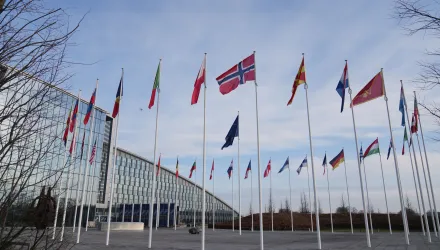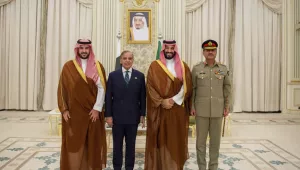Since March 2007, tensions in Pakistan have been rising: the political instability surrounding both the presidential and parliamentary elections is commingling with the increase in militant activity within Pakistan proper, which led to around 60 suicide attacks in Pakistan in 2007. Following Benazir Bhutto's assassination on December 27, the extremists have upped the ante, perhaps hoping to disrupt the February 18 elections. Is Pakistan becoming the world's "most dangerous nation"?
BACKGROUND
Since gaining independence in 1947, Pakistan has veered back and forth between democratically-elected and authoritarian military leaders, coupled with an unstable relationship with neighboring India and Bangladesh. From 1988 to 1999, following Zia ul Haq's death, democracy - albeit an unstable one - reigned; power alternated between Benazir Bhutto and Nawaz Sharif, with neither completing a full term as Prime Minister. Finally, in October 1999, a Chief of Army Staff, Pervez Musharraf, led a coup against Sharif and took over as President.
CURRENT SITUATION
Over the past eight years, President Musharraf has done many good things for Pakistan, most notably building a relatively stable and fast-growing economy (GDP growth in 2006 was 6.5%). However, he has made no effort to create independent institutions, improve the provision of education and other social services, or establish local governance systems and networks. The situation has worsened significantly over the past year: the judiciary is now thoroughly politicized, the media is restricted by a "code of conduct", and the interim government is biased. Meanwhile, Musharraf's approval ratings have almost halved from 51% in late 2006 to 28% in early January 2008. Musharraf continues to prioritize his own political survival; however, he is no longer trusted by either the Pakistani people or the international community, leaving him in an untenable situation.
The recent deterioration of Pakistan's political situation has been driven by the following events:
- In March 2007, Musharraf suspended Chief Justice Iftikhar Mohammed Chaudhry for misconduct, triggering a public outcry. Four months later, Chaudhry was reinstated in a ruling by his own Supreme Court; however, the incident sparked an enormous grassroots movement for change.
- In July, security forces raided Islamabad's Red Mosque, a center for radical and militant thought, killing cleric Abdul Rashid Ghazi and an undetermined number of followers (estimates range from around 100 to over 1000). Consequently, Musharraf lost the support of the mullahs, who wield enormous social and moral power in Pakistan.
- On October 6, Musharraf was overwhelmingly reelected President while still acting as Chief of Army Staff. The majority of opposition delegates boycotted the election, and the Supreme Court began assessing the legitimacy of the results.
- On November 3, Musharraf declared a state of emergency and dismissed Chaudhry once again, staffing the caretaker government and judiciary with loyal supporters. As a result, his already-wavering public support plummeted.
- In late November, Musharraf removed his uniform, appointing General Kiyani as the new Chief of Army Staff, and a day later was inaugurated in a new term as president.
- On December 27, nearly two weeks after Musharraf ended emergency rule, Benazir Bhutto was assassinated at a campaign rally. Her 19-year-old son, Bilawal Bhutto Zardari, and her husband, Asif Zardari, were appointed in her stead. In light of the violence that ensued, the parliamentary elections were pushed back to February 18.
- In January 2008, there were at least four major suicide attacks within Pakistan proper; more have followed. Violence and military activity in the tribal areas has risen significantly.
The lack of predictability and transparency through both the presidential and parliamentary elections has amplified the confusion, the instability, and Musharraf's loss of credibility. Recently, these political fights have been compounded by a concurrent rise in militancy, which has fed into the ongoing sectarian violence throughout Pakistan and the fight for more autonomy in Baluchistan. Security in Pakistan is fading; this fact was made clear in January when refugees flooded into Afghanistan from Pakistan, the former being perceived as providing a safer environment.
SCENARIOS
Short Term: Tensions will remain on the boil at least until the parliamentary elections scheduled for February 18 take place. The militant attacks are not diminishing, and the electoral race continues, complicated by the additional confusion surrounding the new and multi-headed leadership of the PPP. Three scenarios for Pakistan's immediate future are feasible:
- Given the continued violence and particularly if it seems likely that his party will lose badly in the parliamentary elections, it is still possible that President Musharraf could cancel the elections altogether and call a state of emergency. However, it is unlikely that the public would allow Musharraf to maintain this situation for long; ultimately, he would be removed from office, either by the military or by the people.
- The elections could be won by the PPP, either by earning a majority or building a coalition with Sharif's PML-N or Musharraf's PML-Q. If the former coalition is created, then Musharraf will likely be ousted from power and prosecuted for his recent actions. Polls conducted in November 2007 found that if a legitimate election were held, the PPP would win by a slight margin. In early February 2008, polls predicted that the PPP had gained additional sympathetic support after Bhutto's assassination, further increasing their vote bloc.
- Given polling data, it is clear that if Musharraf's party, the PML-Q, wins the parliamentary elections, it will be an illegitimate win. Under these circumstances, there will be a massive popular backlash and he will be ousted.
Regardless of who wins, all of the leading candidates will likely pursue similar policies to Musharraf, with differing levels of competence. Stability will be maintained by the military, particularly given the continuity that General Kiyani brings to the leadership. Any of the candidates for Prime Minister will face the same challenges; variance in their performance will be in the margins, with Sharif likely engaging more with the mullahs and the PPP following a more socialist economic policy.
Long Term: Perhaps the more important factor than the winner is the process followed, and whether the people feel their voices are being heard and their participation encouraged. Pakistan is at a crossroads. It could either follow a slow descent into further authoritarianism and increased militancy and extremism that will be clearly detrimental to Pakistan today and could in 5 to 7 years also become a danger to the rest of the world. Alternatively, it could pursue a slow ascent towards a more stable democratic system with established independent institutions, growing economy, and a nation representative of a moderate Muslim democracy. The people's continued participation will raise the probability of the latter path being taken and so, above all else, it is important that this is encouraged. However, either path is a gradual one, and as such requires patience and a long-term perspective from both Pakistanis and the international community.
RECOMMENDATIONS
The United States needs to pursue the following policy priorities and guidelines:
- Pursue a long-term strategy rather than a short-term one.
- Build trust between the U.S. and Pakistan and its people: Given perceived past fickleness and hypocrisy over promoting democratic sentiments but supporting authoritarian leaders (specifically Musharraf), the Pakistani people do not trust the U.S. Without this, the will to pursue joint interests vigorously will be limited.
- Support democratic processes and stability first and foremost: This means also supporting Pakistan's current focus on the Pakistani Taliban rather than on al-Qaida as being the greater direct threat to Pakistan in the immediate term.
- Prevent Pakistan from becoming the next epicenter of terrorism: This entails continuing to support Pakistan's military efforts at destroying the terrorist threat, as well as engaging hearts and minds, bringing the Federally Administered Tribal Areas (FATA) into Pakistan proper.
Given these priorities, the United States should alter current policy by:
- Explicitly stating its support for free and fair elections and, more pertinently, support for the legitimate winner of these elections (discarding the current U.S. ambiguity of supporting both credible elections and President Musharraf in particular);
- Reallocating a greater proportion of current U.S. military assistance to training Pakistan's military in counter-insurgency in Pakistan in the short-term and in the United States in the long-term.
- Transferring around 15% of current military assistance to social and economic assistance specifically to democracy building efforts, supporting independent institutions and grass-roots political organizing.
- Monitoring the current U.S. spending to the Federally Administered Tribal Areas (FATA) and increase as capacity allows.
DOWNLOAD
Dormandy, Xenia. “Pakistan Political Stability.” February 11, 2008





